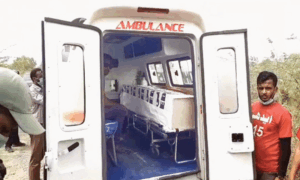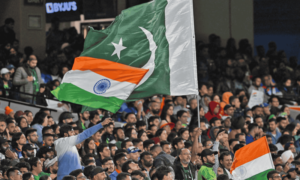Paediatric palliative care doesn’t erase the harsh reality of illness; rather, it softens the edges and provides renewed hope.
The Quetta Gladiators were playing the Lahore Qalandars in the ninth edition of the Pakistan Super League in Karachi. The Gladiators sealed the playoff by six wickets — with the most crucial one taken by former Pakistan pacer Muhammad Amir.
Amir’s performance that day barely impressed his critics. But it was a smashing hit for a 14-year-old fan of his with the same name, who had been also watching from the bleachers at National Stadium that day.
It was a dream come true for this teenager, MA, to attend the match as he had to first get the go-ahead from his oncologist and palliative care physician to attend. Amir’s life-threatening Acute Myeloid Leukemia, which was diagnosed two years earlier, had forced him to give up school but his fever for cricket had not abated. When he told our Quality-of-Life team of Aga Khan University’s paediatric palliative care service how much he yearned to see Muhammad Amir in action, we scrambled to get him PSL tickets so he could watch his favourite team and player in the flesh.
Paediatric palliative care doctors, as defined by The Lancet, care for children with serious and complex illnesses. They prepare the family with anticipatory guidance on what’s ahead in this difficult journey, during which communication between parents and children often dwindles as both try to protect each other from pain facing the inevitable. Paediatric palliative care doctors walk this journey with the family and patient, providing constant, holistic support throughout the child’s illness to ensure they experience the best possible quality of life given the prognosis.
In Pakistan, less than half of children with cancer survive and many more of them are diagnosed with inherited life-limiting disorders such as muscular atrophies and dystrophies, myopathies, leukodystrophies, cystic fibrosis, and epilepsy syndromes. This means that thousands of them and their families direly need palliative care, which is a relatively new healthcare concept in Pakistan. Most of our common conversations on illness tend to revolve around prevention and cure. But if there is none, we tend to avoid discussion on the other outcomes. That is where palliative care steps in.
Not the usual kind of hope
Paediatric palliative care is often misunderstood. It is not about giving up hope; rather, it’s about redefining it. It focuses on living well and as fully as possible, even in the face of serious illnesses.
For children battling cancer, genetic disorders, severe congenital conditions, or complex illnesses, palliative care ensures improved quality of life, effective pain management, psychosocial support, and dignity throughout their journey, whether toward recovery or death. It also includes providing families with holistic care that addresses not only physical symptoms but also emotional, spiritual, and social needs.
Yet, our healthcare system remains devoid of paediatric palliative care. And the challenges are manifold.
In Pakistani society where the management of pain and non-pain symptoms, as well as psychological, emotional, and social suffering, remains absent, discussions about death, terminal illness and grief are severely neglected. As a result, families are often unaware of how these sufferings contribute to the overall quality of life, as well as how palliative care can help them navigate through these challenges.
Many healthcare providers caring for these children lack formal training in palliative care, leading to missed opportunities for early intervention which could significantly reduce a child’s and family’s suffering. With scarce palliative care programmes, families often struggle to access specialised support.
Compassion, dignity and improving quality of life
When six-year-old AU was admitted to the oncology ward at the Aga Khan University Hospital, her fragile body carried the weight of an aggressive cancer diagnosis. She was in physical and emotional pain and was retreating into silence as her mother looked on helplessly. Like many families, they believed that if a cure wasn’t possible, there was nothing more to do.
But then something unexpected happened.
Our Quality-of-Life team visited her, not to replace the treatment for her disease, but to walk alongside her through it. We adjusted her medications to better manage her pain and nausea. We spent time with her, engaging her and arranging small surprises to brighten her days.
Her parents, too, received support, learning how to care for her both at the hospital and at home. They also understood how they could manage their own fears, and most importantly, realised that comfort and quality of life were still within reach.
When a four-year-old boy named MR’s blood cancer resurfaced a second time in 2023 and his condition worsened, we approached his mother and asked her if she would consider memory-making with a pendant made of his tiny fingerprints.
She found the idea comforting and became involved with the designer who set them overlapping to form a heart. MR passed away on November 4, 2023. In the ensuing months, his mother would often go up to the base of her throat where the pendant sat. She would caress the filigreed grooves and the tiny object would offer something ineffable.
“People don’t know what palliative care is; it’s not about dying, it’s about how the rest of the days are spent,” she said.
Parents are now requesting memory-making with these pendants which can be made in gold or silver. Sometimes, they come with fingerprints, sometimes messages handwritten by their children, sometimes it is the favourite drawing of their child. The designer and jeweller craft each memento free of cost and the effort is supported by a group of wonderful ladies called Choti Choti Khushiyan.
Just the beginning
Palliative care is well established in other parts of the world but in Pakistan and much of South Asia and the East Mediterranean region, it remains misunderstood and underused, especially for children.
People believe that palliative care means giving up hope. But hope isn’t just about a cure; it is about ensuring that every child, regardless of their prognosis, can live with dignity, comfort, and joy.
And this is just the beginning. To truly meet the needs of Pakistan’s youngest and most vulnerable patients, palliative care must be integrated into the national healthcare agenda. This means allocating resources for specialised training, establishing palliative care in hospitals across the country, and, perhaps, most importantly, shifting cultural perceptions about what it means to care for a child with a life-threatening and life-limiting illness.
Additionally, it is crucial to work with policymakers to ensure sustainability. The Quality of Life offers a glimpse into what compassionate healthcare should look like. It is a model not just for Pakistan, but for the world, demonstrating that even in resource-limited settings, it is possible to provide dignified, high-quality care.
For children like MA, AU, and MR palliative care doesn’t blunt the reality of an illness, but it can soften its edges. It provides a different kind of hope, one that ensures that even in the face of unimaginable challenges, life can still hold moments of light, love and meaning.
Artwork by Obair Khan
- Desk Reporthttps://foresightmags.com/author/admin/











